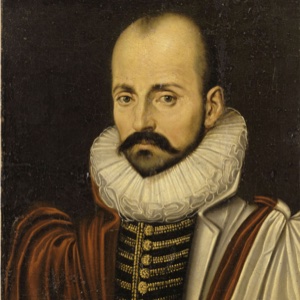
Michel Eyquem de Montaigne (1533 – 1592) was one of the most significant philosophers of the French Renaissance, known for popularizing the essay as a literary genre. His work is noted for its merging of casual anecdotes and autobiography with intellectual insight. His massive volume, Essais, contains some of the most influential essays ever written. However, during his lifetime he was admired more as a statesman than as an author. Montaigne had a direct influence on Western writers, including Francis Bacon, René Descartes, Blaise Pascal, Jean-Jacques Rousseau, William Hazlitt, Ralph Waldo Emerson and Friedrich Nietzsche.

Quotes by Montaigne…
The bees visit the flowers here and there, but they make honey of them which is all their own; it is no longer thyme or marjoram: so the pieces borrowed from others he will transform and mix up into a work all his own.
I care not so much what I am in the opinion of others, as what I am in my own. I would be rich of myself, and not by borrowing.
Nothing is so firmly believed as what we least know.
We are never present with, but always beyond ourselves. Fear, desire, and hope are always pushing us towards the future.
All other knowledge is hurtful to him who has not the science of honesty and good-nature.
Fortune does us neither good nor hurt; she only presents us the matter, and the seed, which our soul, more powerfully than she, turns and applies as she best pleases; being the sole cause and sovereign mistress of her own happy or unhappy condition.
There is no passion that so much transports men from their right judgement as anger.
The most certain sign of wisdom is continual cheerfulness; her state is like that of things in the regions above the moon, always clear and serene.
This is the greatest work of all. In order to show and release her powers, Nature has no need of fortune; she shows herself equally on all levels, and behind a curtain as well as without one. To compose our character is our duty, not to compose books, and to win, not battles and provinces, but order and tranquility in our conduct. Our great and glorious masterpiece is to live appropriately. All other things, to rule, to lay up treasure, to build, are at most but little appendices and props.
